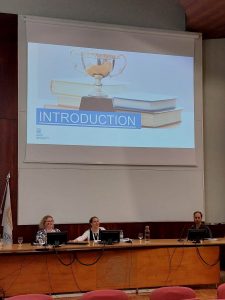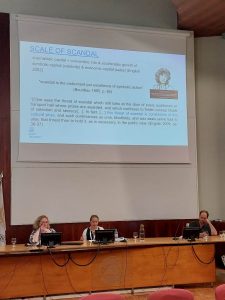This year, I presented at the By The Book Conference for the first time on the 21st of June. The conference was co-organised by the University of Porto, where it took place, and the Oxford Brookes University. It’s an initiative of the European Publishing Studies Association (EuroPub) which aims to “foster knowledge exchange around the contemporary book trade”. The conference contributions focus on the book publishing industry and the field of publishing studies in general.
My conference contribution focused on the influence and impact of scandal on literary prizes dependent on journalistic capital, examining the 2012 scandal surrounding the Not The Booker Prize and the Twitter-discourse.
For more information on the conference and the program, please consult the conference website.
 “So much for literary democracy”: Journalistic Capital and the The Influence and Reception of Scandal Surrounding Literary Prizes on Social Media
“So much for literary democracy”: Journalistic Capital and the The Influence and Reception of Scandal Surrounding Literary Prizes on Social Media
Literary prizes, increasingly topic of research (e.g Moser 2004, English 2009, Leinen 2010, Ducas 2013, Röhricht 2016, Sapiro 2016, Auguscik 2017, Childress et al. 2017, Kennedy-Karpat and Sandberg 2017, Rahmann 2017, Mosely 2019), function as traditional literary gatekeepers and are responsible for the institutionalised consecration of literary texts. Contemplating Bourdieu’s field of cultural production (1983) literary prizes are frequently discussed in terms of economic and symbolic capital, but they can also bestow visibility. James English thus proposes journalistic capital, which may accelerate the accumulation of symbolic capital (2002, p. 115) and represents “the marketability of the award and its winners” (Squires 2013, p. 293).
Scandal is hardly unusual (English 2002, p. 113), though valuable, established and prestigious prizes (e.g. Booker Prize) are generally able to weather public opinion. But what challenge does bad publicity pose for a prize which relies almost exclusively on journalistic capital? As a case study, I shall examine the 2012 edition of the Not The Booker Prize (NTBP), when the behaviour and back-room negotiations of a contender scandalised organisers and audience alike. The NTBP was created by left-wing The Guardian in 2009 as a democratic literary counter-prize. Officially, winners receive nothing but a “Guardian”-mug. Although relatively low in both symbolic and economic capital, because the newspaper is able to use its own platform, the prize generates a lot of media attention and therefore predominantly awards journalistic capital. Besides nominating and voting in the newspaper’s comment section, the audience also discusses the prize on Twitter. Within this context, I aim to study the figure of the layperson critic as an additional literary gatekeeper on social media platforms. For this, I will analyse the tweets created in the immediate wake of the scandal to gain insight into the content of the user-generated literary criticism.
 Bibliography:
Bibliography:
Auguscik, Anna. Prizing Debate: The Fourth Decade of the Booker Prize and the Contemporary Novel in the UK. Transcript, 2017.
Bourdieu, Pierre. ‘The Field of Cultural Production, or: The Economic World Reversed’. Poetics, vol. 12, no. 4, 1983, pp. 311–56.
Childress, Clayton, et al. “Publishers, Authors, and Texts: The Process of Cultural Consecration in Prize Evaluation.” Poetics, vol. 60, Feb. 2017, pp. 48–61.
Ducas, Sylvie. La littérature à quel(s) prix? Histoire des prix littéraires. La Découverte, 2013.
English, James F. “Winning the Culture Game: Prizes, Awards, and the Rules of Art.” New Literary History, vol. 33, no. 1, Johns Hopkins University Press, 2002, pp. 109–135.
English, James F. The Economy of Prestige: Prizes, Awards, and the Circulation of Cultural Value. Harvard University Press, 2009.
Kennedy-Karpat, Colleen, and Eric Sandberg. Adaptation, Awards Culture, and the Value of Prestige. Springer Berlin Heidelberg, 2017.
Leinen, Angela. Wie man den Bachmannpreis gewinnt. Gebrauchsanweisung zum Lesen und Schreiben. Heyne, 2010.
Moseley, Merritt. ‘How the Booker Prize Won the Prize’. American, British and Canadian Studies, vol. 33, Dec. 2019, pp. 206–21.
Moser, Doris. Der Ingeborg-Bachmann-Preis. Börse, Show, Event. Böhlau Verlag, 2004.
Pickford, Susan. “The Booker Prize and the Prix Goncourt. A Case Study of Award-Winning Novels in Translation.” Book History, vol. 14, 2011, pp. 221–240.
Rahmann, Kathrin. Von der Wirkung zur Wertung. Formal-ästhetische Werte in den Diskussionen des Ingeborg-Bachmann-Wettbewerbs 1999-2009. 2017. Georg-August-Universität Göttingen, PhD dissertation.
Röhricht, Karin. Wettlesen um den Ingeborg-Bachmann-Preis. Korpusanalyse der Anthologie Klagenfurter Texte (1977-2011). Studienverlag, 2016.
Sapiro, Gisèle. “The Metamorphosis of Modes of Consecration in the Literary Field: Academies, Literary Prizes, Festivals.” Poetics, vol. 59, Dec. 2016, pp. 5–19.
Squires, Claire. ‘Literary Prizes and Awards’. A Companion to Creative Writing, edited by Graeme Harper, John Wiley & Sons, Ltd, 2013, pp. 291–303.